Twilight Visitor
Thursday, October 30, 2014
Twilight Visitor
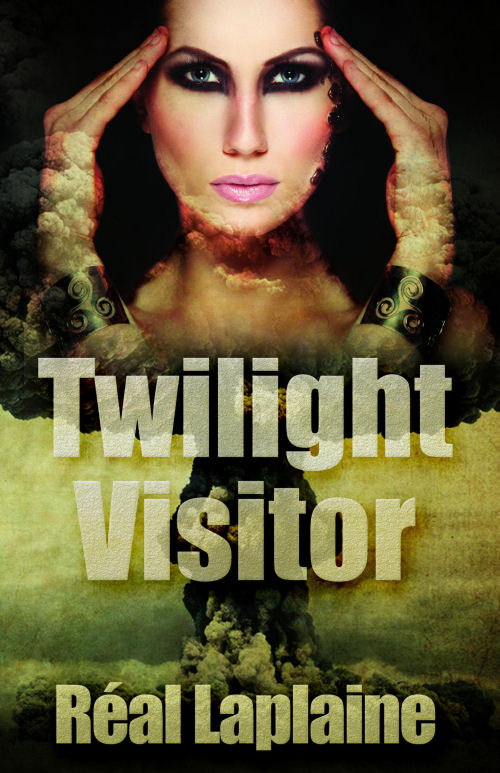 My choice this time is a slight cheat. It’s actually set in Afife which is technically in Portugal, albeit by only twenty miles. But my blog, my rules! My choice this time is a slight cheat. It’s actually set in Afife which is technically in Portugal, albeit by only twenty miles. But my blog, my rules!
Twilight Visitor is a strange book. It’s a bit science fiction, a bit political thriller and a fair bit philosophical. This caught my eye as it’s a recent release by Reál Laplaine, a thriller writer of some note who has recently been receiving a lot of good press. The main thread of the book is a conversation which takes place on the beach at Afife, a huge and usually fairly deserted sandy stretch on the northerly borders of Portugal and Spain. Whilst the conversation is taking place, the last great conflict is about to be enacted in the middle east. China is squaring up to Iran over oil and the world edges relentlessly towards nuclear war.
On the beach at Afife, a lonely and disillusioned man meets a beautiful and enigmatic woman. She introduces herself as Serena and together they drink wine and talk. A parallel story follows the main players involved in the rapidly approaching world holocaust as they attempt to prevent the headlong rush towards Armageddon . The juxtaposition between the two narratives is handled skillfully and in lesser hands could well have resulted in an unintelligible mess. Laplaine’s mastery of the two plot lines is quite extraordinary as he balances the pastoral and tranquil setting of the beach scenes with a high concept thriller that is comparable with the best of Dan Brown or Jack Higgins.
Through the conversations we learn that the visitor Serena is much more than she appears and it gradually becomes apparent she’s not even human. Her target, this lonely and disillusioned man on a deserted beach unknowingly holds the key to preventing the seemingly inevitable nuclear war. She has to convince him that a fragment of knowledge he holds can move the world back from the brink of total annihilation. But time is running out and the man is skeptical.
The settings that Reál Laplaine has chosen are perfect. We move from the beautiful scenery of the Atlantic coastal village to the war room of the Pentagon and the deserts of Iran with ease. Whilst the Super Powers seem incapable of pulling the situation back from the edge, conversations take place in a small bar in a tiny Portuguese village that may well turn the course of this rapidly escalating conflict.
Laplaine’s view of world politics is both challenging and thought provoking as he explores the nature of corporate interest on developing nations. He clearly knows his subject and his ideas on the way technology could be better utilised for the good of the indigenous populations rather than the blind pursuit of profit make for interesting reading.
Twilight Visitor is a highly unusual book and probably its stumbling point will be its refusal to conform to genre. The thriller reader may be put off by the long pastoral scenes and the science fiction reader may be disappointed by the enigmatic nature of the alien who is not about to send in a fleet of battle cruisers to save the day. But for those who are willing to try something a bit different this a very rewarding book.
Twilight Visitor by Reál Laplaine is published by Netherworld Books
 0
Like
Published at 5:14 PM Comments (1)
0
Like
Published at 5:14 PM Comments (1)
Wild Spain
Friday, October 24, 2014
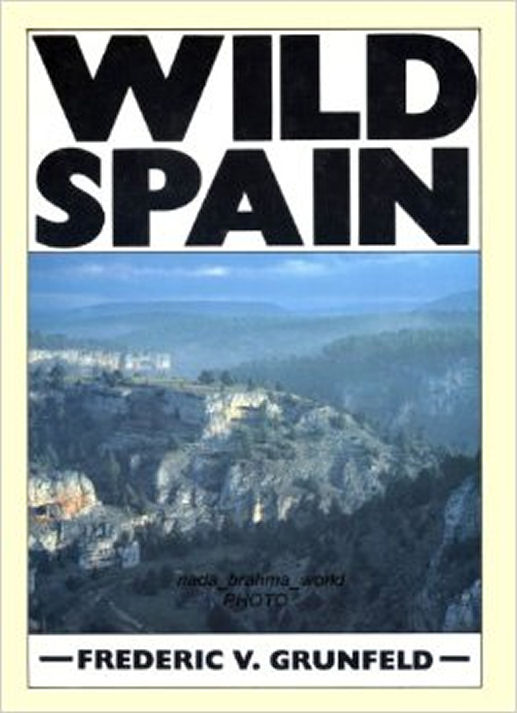 It came as a great surprise to me when I discovered the distinct lack of books about the wildlife of Spain. It came as a great surprise to me when I discovered the distinct lack of books about the wildlife of Spain.
For such a huge and diverse country which ranges from the snowy peaks of the Sierra Nevada to the lush forests of Catalonia or the arid desert of Almeria one would think the sheer variety of wildlife alone would give rise to a whole library of books on the subject.
Search Amazon for books about wildlife in Britain and one is presented with over 2,000 titles yet try the same thing with Spain and apart from a handful of bird watching books, probably aimed at the visiting British twitcher, there is very little. A few out of print nature books or a handful of general guidebooks to Spain but nothing which really covers the wildlife in any depth.
Some years ago I managed to obtain an out of print copy of Wild Spain and if one wants a good view of Spanish wildlife this is certainly a book to hunt down. Note, there are actually two books titled Wild Spain by different authors, I have them both but the one I am currently reviewing is the hardest of the two to find by Frederic V Grunfeld.
Although this version was published in 1988 much is still as relevant today as the day it was printed. The roads he describes are now more developed and there is a wider choice of places to stay but of course the landscapes and wildlife remain pretty much unchanged.
The book is set out in a highly accessible and organised manner. The landscape of Spain is diverse in both its wildlife and its geology and refuses to conform to the neat lines of the autonomous regions so Grunfeld largely ignores these artificial divisions, preferring instead to divide it into nine geologically defined sectors including the Balearics and Canary islands.
The first thing one notices about this book is the remarkable quantity and depth of information provided. This is definitely not a travelogue with whimsical descriptions of little white villages or tasty tapas, This is a neatly structured informational resource of quite extraordinary detail.
Each of his chosen geographical sections are further divided into a dozen smaller regions, although again with little regard to human demarcation lines which are subject to the vagaries of politics.
In each area he describes, he gives the nearest airports and public transport. He explains how to reach each place by road, rail and bus. He then goes on to list all the names and numbers of the maps which cover the area and provides a useful selection of guidebooks for further reading. He also give a selection of places to stay although sadly, many of these places no longer exist.
And in case one takes the impression this is just a dry, dense fact book consider this evocative description, “What really struck me as I sat looking down on this incredible landscape, was the sound of the swift’s wings ripping through the air close to my head, the noise strangely mirrored by the rasping of the scythes as the local people harvested their wheat and barley in the valley below.” Grunfeld has mastered the difficult task of blending a huge amount of factual data with flashes of poetic beauty.
His descriptions of each area include an in depth discussion of the flora and fauna, the climate, landscape and scenery, He points out places that one should visit including many still very remote and untouched locations.
The photographs that pepper the text are, with a few exceptions, mostly informative rather than artistic. There are also a good number of sketches of the local wildlife and some clear maps on how to locate each place.
All in all, this is quite an extraordinary work with a staggering amount of information. It’s such a shame this marvellous book is currently out of print and very difficult to locate as there are no current publications that comes anywhere close to this. Unfortunately the author died just as this book was published.
Publisher: Ebury Press
ISBN-13: 978-0852236932
 0
Like
Published at 8:48 AM Comments (3)
0
Like
Published at 8:48 AM Comments (3)
Drunk in Charge of a Foreign Language
Friday, October 17, 2014
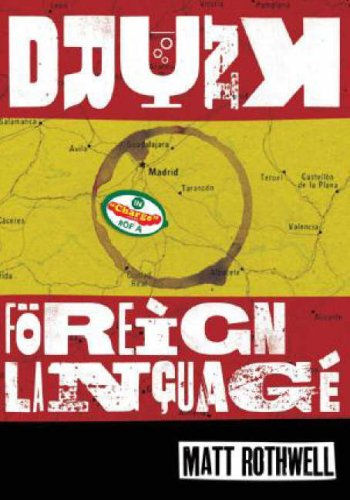
A more light-hearted offering this time and a book which made me laugh out loud many times. Matt Rothwell’s book is a comic travelogue of his extended camping trip around Spain. His love of the country and the people clearly shows through and is a welcome change from the plethora of tales of travellers who just seem to want to moan about the country and its people.
He recounts with great fun and a warm, self effacing humour, his encounters with the locals and fellow travellers alike. His descriptions of the places he visits are clear and vivid but he maintains balance and never becomes lost unnecessary detail. For all its length, both as a journey and the book, it still seems like a whirlwind tour as his travels take him to many places just off the usual tourist maps.
Much of the humour arises from Matt’s encounters with the locals where they are always portrayed in a warm, positive way and neatly avoids the usual travelogue clichés of stereotyped foreigners. A running gag throughout the book is his struggle to find a bank who will deal with his particularly obscure type of traveller’s cheques. Here again, we are shown his self effacing style as the cause of his difficulties is never presented as the fault of uncooperative locals but clearly as the advisor who persuaded him to carry that brand of cheques.
More good natured humour comes from his struggles to learn the language and the many mistakes made, often with unexpected consequences. We share his frustrations as his neatly constructed itinerary is constantly disrupted by weather or a desire for the comfort of a hotel as opposed to planned campsites.
The book presents an unexpected twist at one point when his wife suddenly announces she wants a divorce halfway round the tour and heads for home. Matt is faced with a dilemma but in true explorer spirit he is not going to let this turn disrupt his careful planning and sets out to continue his travels alone. The touch of pathos that shows through the following chapters is lifted by his incorrigible sense of humour as his determination to see through his mission continues in true British style.
Overall a very funny and well written book that clearly shows Matt’s love of Spain and its people. Well recommended.
Drunk in Charge of a Foreign Language (The Diary of a Spanish Misadventure). Published by Ametralladora 2007.
 0
Like
Published at 8:47 AM Comments (0)
0
Like
Published at 8:47 AM Comments (0)
The Ghosts of Spain
Friday, October 10, 2014
The Ghosts of Spain is a somewhat personalised view of Spain. However the personalisation comes in this case not from the Author but from the people of Spain themselves. Giles Tremlett manages an empathetic view as to how this country is seen through the eyes of its populace.
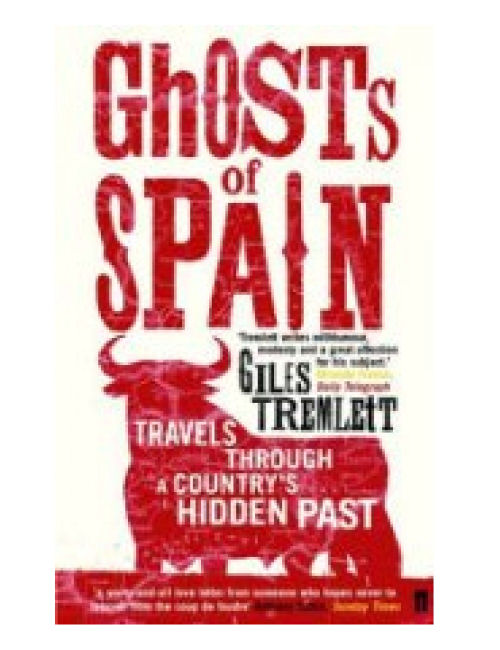 Tremlett is the Madrid correspondent for the Guardian and has lived there for around twenty five years. His knowledge of the country is enviable and his ability to relate this in a readable form is to be admired. This book achieves the perfect balance of sufficient detail to inform but stops short of an educational tract. This should not be seen as a history of Spain but more as a view of the impact of this history on a nation. Ultimately he is a story teller and he has written a book which is easily digestible and leaves the reader to pursue further studies if they wish. Tremlett is the Madrid correspondent for the Guardian and has lived there for around twenty five years. His knowledge of the country is enviable and his ability to relate this in a readable form is to be admired. This book achieves the perfect balance of sufficient detail to inform but stops short of an educational tract. This should not be seen as a history of Spain but more as a view of the impact of this history on a nation. Ultimately he is a story teller and he has written a book which is easily digestible and leaves the reader to pursue further studies if they wish.
In the early parts of the book Giles shows how the civil war which killed 500,000 people, more than the number of British deaths in WW2, is almost a hidden war. This tragedy still lies buried just below the surface and by some tacit understanding, it remains there. The author shows his journalistic frustrations at this silence but in the end he seems to understand the necessity of avoiding the opening of still fresh wounds to this now progressive nation. To me this code of silence is akin to that of an old married couple who have agreed to never mention the ‘Big Affair’. The country has managed to avoid pointless recriminations and is probably the reason for Spain’s ability to move forwards and its rapid transition to modern democracy.
The thrust of this book is to show how the history and politics of a country still impacts on its culture today. As a Brit, I understand instinctively how events like 1066, The World Wars, the IRA bombings or our royal family still impact on our day-to-day life but it is impossible to convey this succinctly to somebody from outside the U.K. In this, Giles does an admirable job and presents a hundred years of cultural influence quickly and in a readily understood way.
The more recent history of the Basque and Catalan problems is concise and seemingly well balanced but are presented to inform the lay reader and not intended as a deep political treatise.
His coverage of the recent scandals concerning the construction boom is incisive and accurate. He manages to show how the confusion and petty corruption led to much wider problems which ended, as we all know, in major corruption and the crash and stagnation of the building sector which is still crippling the country’s recovery.
I found the section on the Flamenco particularly eye-opening. It is not an art form I’ve ever found personally attractive so I guess I’ve only ever seen the usual simplistic versions. Giles brings us the darker side of this and shows it as a sort of street music, more akin to the gangster-rap of today than the pretty folk dancing with which it often associated. He exposes the ghettos that gave it life and the dark underbelly that is still tangled in poverty, gypsies and drug abuse. It’s a remarkable insight.
The book is highly readable, as one would expect from a journalist, yet it still manages to cover its subjects in surprising depth. However, there is one notable exception and that is The Corrida. The bullfight is still a huge part of the Spanish culture and psyche that it seems odd he passes it by with just a few brief mentions. Whilst I personally find it horrendous and cruel I do recognise its importance to huge parts of Spain. It seems odd that Giles feels comfortable to poke at the open sores of the civil war yet avoid this subject with such deftness. Perhaps either he, or his publishers, saw it as too divisive and potentially damaging to sales?
Giles shows us Spain as a wonderful dichotomy. On the one hand it is still emerging from the dark, secretive and oppressive fascism of Franco, yet on the other hand it is one of the most progressive nations in the world. The strong Catholicism contrasts with the openness and willingness to accept different lifestyle choices. It is the first country in the world to allow gay police officers to cohabit and its attitudes to prostitution, naturism, and other alternative lifestyles are truly inspiring.
For people looking for a good introduction to Spain that runs much deeper than the usual guidebooks this is essential reading. It is a very good and concise exploration of modern Spain and how it became the country it is today.
 1
Like
Published at 11:05 AM Comments (6)
1
Like
Published at 11:05 AM Comments (6)
Driving Over Lemons
Monday, October 6, 2014
For my first Books On Spain review there can really only be one contender and that’s Chris Stewart’s wonderful autobiography, Driving Over Lemons. Living in the same area as Chris it’s lovely to see through his eyes this region as it was when he arrived here twenty five years ago. Much has changed in that time but much hasn’t.
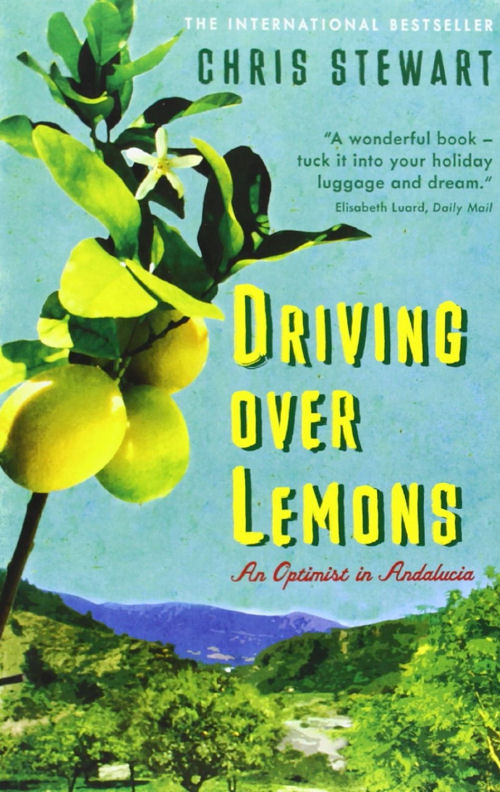 The book is beautifully written in the way only the English can manage, a lyrical and understated style that’s filled with gentle humour. Chris is an eternal and self confessed optimist and to him the glass is never half empty or half full, it’s always full. He tackles living in this harsh and demanding environment with a belief that no problem is insurmountable and any setback is just a minor deviation to his plans. The walls of his house tumble down, the roof leaks and the insects invade but Chris just goes to work and the small farm just seems to respond to his touch and thrive. His willingness to integrate with the local community is a lesson to all those who wish to settle in any foreign country. His acceptance of the customs and ways of the region builds strong and enduring friendships that are still evident even in his latest book, Last Days of the Bus Club. The book is beautifully written in the way only the English can manage, a lyrical and understated style that’s filled with gentle humour. Chris is an eternal and self confessed optimist and to him the glass is never half empty or half full, it’s always full. He tackles living in this harsh and demanding environment with a belief that no problem is insurmountable and any setback is just a minor deviation to his plans. The walls of his house tumble down, the roof leaks and the insects invade but Chris just goes to work and the small farm just seems to respond to his touch and thrive. His willingness to integrate with the local community is a lesson to all those who wish to settle in any foreign country. His acceptance of the customs and ways of the region builds strong and enduring friendships that are still evident even in his latest book, Last Days of the Bus Club.
For those who have just arrived from Mars, Chris Stewart was the original Drummer with the Prog Rock band Genesis. He left them just before they became famous and toured the world working on farms or wherever he could find a job until he eventually settled in Spain in 1988. Driving Over Lemons relates the early days of his new life in the Alpujarran region of Andalucía. The book is written with such a warm charm that seems to make carving a living from this rough terrain somehow fun. So much so, that he has been credited, or accused depending on one’s viewpoint, of single handedly starting a mass expat migration to the area. Many of whom, lacking Stewart’s tenacity and optimism headed home just as rapidly. It is a credit to his writing skills that Chris can make a tumble down shack with no electricity or running water an aspirational dream but this is exactly what he does.
Christ Stewart has since written three follow on books relating his later years at El Valero.
 0
Like
Published at 8:33 AM Comments (5)
0
Like
Published at 8:33 AM Comments (5)
Spam post or Abuse? Please let us know
|
|